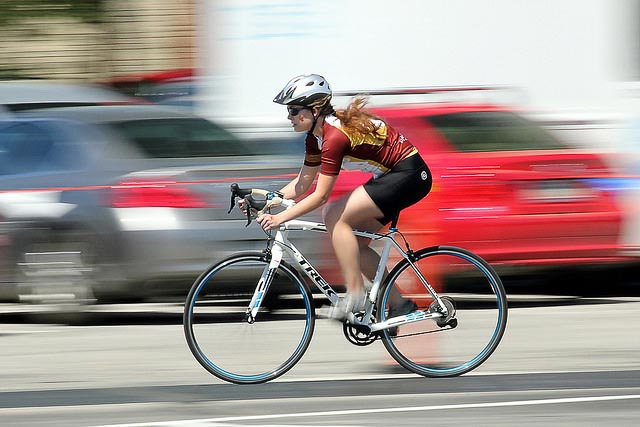To join the study, visit kinder.rice.edu/NearMiss/ (Link is no longer active)
For most bicyclists, the feeling of a car zipping by too close to their shoulder is a familiar one. Pedestrians, too, have had their near misses as cars roll through crosswalks. Even drivers have their fair share of “oh man, that was close” exhalations.
While we’ve all had these experiences in one form or another, we don’t know much about their occurrence. We have our own memories of where a dangerous stretch of road or sidewalk might be, but we’ve done little as a city to identify those sites on a broader scale, or to try to confront the reality that some streets still need work to be safe for all users.
As we’ve covered here on the Urban Edge, and as the Houston Chronicle has been shining light on recently, the issue of safe streets is one the city of Houston and our region can no longer ignore. According to the Houston-Galveston Area Council’s Pedestrian-Bicyclist Subcommittee, crashes involving bicyclists are up by 7.1 percent as compared to last year. And fatalities among pedestrians as a result of involvement in crashes are up by 47.2 percent. There are many factors contributing to why these numbers are up—but we know that we need safer streets.
In an ongoing research project, the Kinder Institute wants to document these near-miss incidents in hopes that we may be able to draw out patterns or highlight hotspots of conflict between various road users. We need Houstonians to help us do it.
In collaboration with partners such as Bike Houston, we’re enlisting volunteers who bike, walk or use transit on a daily or weekly basis to participate in a multi-pronged study to document daily travels across the city and record near miss incidents.
We can tie the data collected in this study with other ongoing Institute research to identify areas or types of streets where users are experiencing travel challenges. We then intend to use that information to work with officials, advocates and Houstonians to address those conflicts spots. This is particularly fruitful time for this conversation given the ongoing work around the Houston Bike Plan and the continued refinement of the city’s complete streets framework.
We need participants to report their daily trips for one week between March 4 and 10. The trips will be reported through an online travel diary, and any near misses experienced will be sent in via the diary (for iPhone users) or via a Safe Activity app (for Android users). Finally, participants who bike regularly will be asked to make a Love to Ride user profile and link it to an activity tracker app so that the bike trips you make can be recorded via GPS.
We’ve made participating very simple. The travel diary will be automatically emailed to you every day to fill out in about 15 minutes. Those using the Safe Activity near-miss app will easily record any incidents. And once you’ve signed up for Love to Ride your phone will do the rest. If you complete 7 days of the travel diary you’ll be entered to win a $100 gift card and will have helped Houston learn more about how are streets are working for all users.
Visit our registration and study homepage here (Link is no longer active) for more information about the study and to watch some training videos to get a sense of the steps it requires. We’ll be at the Bike Houston annual Houston Bike Summit on February 27 and will be hosting a training event on March 2 at Rudyard's Pub from 5-7 p.m for drink, snack and discussion of the project.
We hope you’ll join us for this study.
To join the study, visit kinder.rice.edu/NearMiss/ (Link is no longer active)


